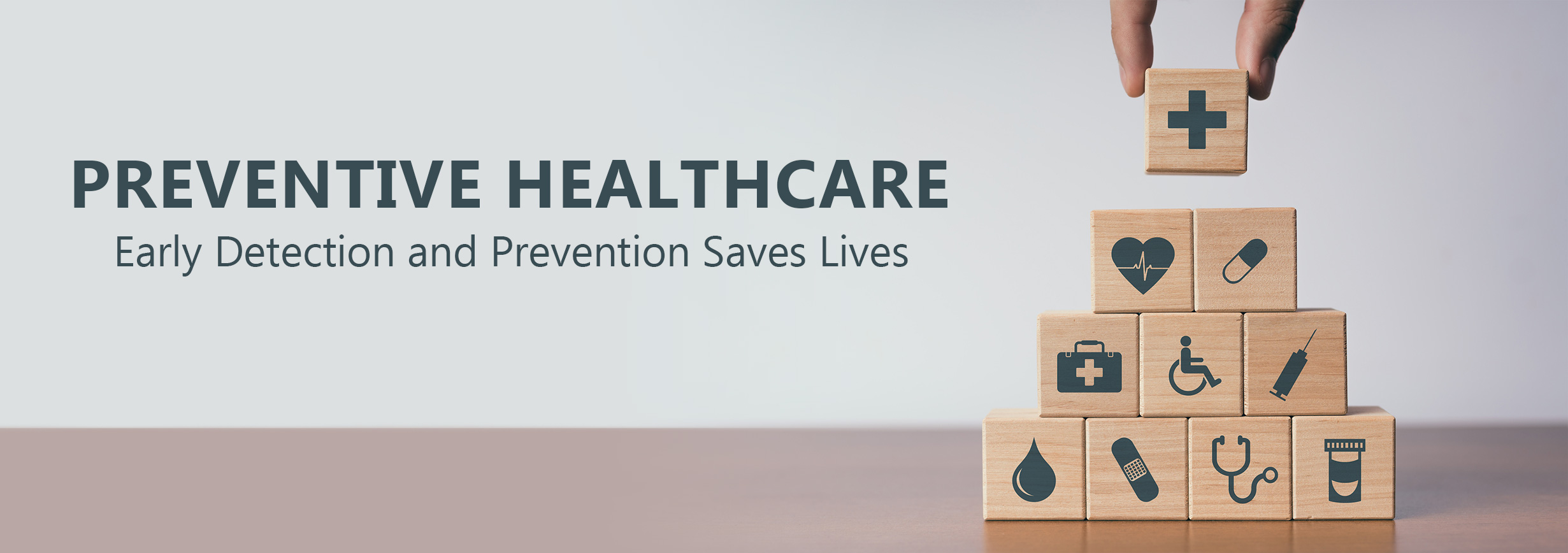Introduction
Preventive healthcare is a proactive approach to maintaining good health and preventing diseases before they become serious. By prioritizing regular check-ups, screenings, and vaccinations, individuals can detect potential health issues early and avoid the complications that come with untreated conditions. This approach not only improves the quality of life but also reduces healthcare costs in the long term.
In this article, we’ll explore the significance of preventive healthcare, with a focus on why regular check-ups, screenings, and vaccinations are essential for maintaining overall health.
Table of Contents
What is Preventive Healthcare?
Preventive healthcare refers to measures taken to prevent illnesses rather than treating them after they occur. This includes routine medical exams, screenings for various diseases, and vaccinations to protect against infectious diseases. The goal of preventive care is to detect any health issues early, when they are most treatable, or to stop diseases before they start.
Regular preventive care helps you stay on top of your health and take steps to manage risks, even when you feel perfectly healthy. It’s about being proactive instead of waiting for symptoms to appear.
The Importance of Regular Check-Ups

Monitoring Overall Health
Regular check-ups allow doctors to assess your overall health, monitor any existing conditions, and detect new health problems early. These appointments typically include a physical examination, blood tests, and a review of your medical history. Your doctor can spot warning signs of issues like high blood pressure, high cholesterol, or diabetes before they become more serious, giving you a chance to make lifestyle changes or start treatment.
Building a Relationship with Your Doctor
Routine check-ups also help build a strong relationship with your healthcare provider. Having a doctor who knows your medical history and understands your personal health risks can lead to better care and more personalized advice. Regular visits make it easier for your doctor to notice any changes in your health and recommend preventive measures based on your unique needs.
Early Detection of Health Issues
One of the key benefits of regular check-ups is early detection. Many serious conditions, such as heart disease, diabetes, and cancer, may not show obvious symptoms in their early stages. Regular medical exams can catch these diseases early when they are most treatable, improving outcomes and potentially saving lives. Early detection often means less aggressive treatment, shorter recovery times, and a better prognosis.
The Role of Screenings in Preventive Care
What Are Health Screenings?
Health screenings are tests designed to identify potential health issues before symptoms develop. These screenings vary depending on your age, gender, medical history, and risk factors, and they can range from blood pressure measurements to cancer screenings like mammograms or colonoscopies.
Screenings help doctors catch conditions early, often before you’re aware that anything is wrong. For example, routine blood pressure checks can help detect hypertension, which often has no symptoms but is a major risk factor for heart disease and stroke.
Common Types of Health Screenings
Blood Pressure and Cholesterol Tests
High blood pressure (hypertension) and high cholesterol are leading risk factors for heart disease and stroke, but they don’t always cause noticeable symptoms. Regular screenings for both can help you and your doctor keep these conditions in check, reducing your risk of serious cardiovascular problems.
Cancer Screenings
Cancer screenings are crucial for detecting various types of cancer early, when they’re most treatable. Some common cancer screenings include:
- Mammograms: For early detection of breast cancer.
- Pap smears: To screen for cervical cancer.
- Colonoscopy: To detect colorectal cancer.
- Skin checks: To monitor for skin cancer, especially for those at high risk.
Diabetes Screenings
Screening for diabetes, especially for individuals with risk factors like obesity or a family history of diabetes, can catch the condition in its early stages. Early detection of diabetes allows for better management, reducing the risk of complications such as nerve damage, vision loss, and cardiovascular disease.
Bone Density Tests
Bone density tests are typically recommended for older adults, especially women, to assess the risk of osteoporosis. This condition weakens bones and increases the risk of fractures. Detecting osteoporosis early allows for treatment options to strengthen bones and prevent serious injury.
The Significance of Vaccinations in Preventive Health

How Vaccinations Protect Against Diseases
Vaccinations are a critical component of preventive healthcare. Vaccines work by stimulating your immune system to recognize and fight specific pathogens, such as viruses and bacteria, without causing the illness. This helps your body build immunity against certain diseases, preventing infections before they occur.
Vaccines not only protect the individual who receives them but also contribute to herd immunity. When enough people are vaccinated, it reduces the overall spread of disease, protecting those who cannot be vaccinated, such as infants or people with compromised immune systems.
Common Vaccinations for Adults
While childhood vaccinations are well-known, adults also require vaccines to protect against certain illnesses. Common vaccinations for adults include:
- Flu vaccine: Given annually to protect against seasonal influenza.
- Tetanus, diphtheria, and pertussis (Tdap) vaccine: A booster shot recommended every 10 years.
- Shingles vaccine: Recommended for older adults to prevent shingles and its complications.
- Pneumococcal vaccine: Protects against pneumonia, especially for older adults and those with certain medical conditions.
- COVID-19 vaccine: Offers protection against the coronavirus and its variants.
Vaccinations Across the Lifespan
Vaccinations are important at every stage of life. As you age, your immune system weakens, making it harder to fight infections. Staying up-to-date on vaccinations can prevent illnesses that may be more dangerous for older adults, such as pneumonia or the flu. It’s also essential for young adults and travelers to consider specific vaccines based on their risk factors or destinations.
Preventive Healthcare for Children and Adolescents
Routine Pediatric Check-Ups
For children and adolescents, preventive healthcare starts with routine pediatric check-ups. These visits monitor growth and development, provide vaccinations, and offer an opportunity to address any concerns about your child’s health or behavior. Pediatricians also screen for conditions such as vision or hearing problems, which can affect learning and development if left undiagnosed.
Vaccinations for Children
Vaccines are especially crucial during childhood to protect against diseases like measles, mumps, rubella, polio, and chickenpox. These vaccines have helped virtually eliminate many once-deadly diseases and are a cornerstone of public health. Keeping up with your child’s vaccination schedule ensures that they are protected from these preventable diseases.
Barriers to Preventive Healthcare
Cost and Accessibility
One of the major barriers to preventive healthcare is cost. Many individuals forgo regular check-ups and screenings due to concerns about the expense. However, preventive care is often covered by insurance, and many public health programs offer free or low-cost screenings and vaccinations. Investing in preventive care can save you from costly medical bills down the road by catching problems early.
Fear or Anxiety About Medical Procedures
Fear of doctors, medical procedures, or test results can also prevent people from seeking preventive care. It’s important to remember that early detection significantly improves treatment outcomes, and many preventive procedures, like blood pressure checks or vaccinations, are quick and painless. Speaking with your doctor about your concerns can also help alleviate anxiety.
Frequently Asked Questions
- How often should I get a check-up? It depends on your age, health status, and risk factors, but generally, adults should have a check-up at least once a year.
- Are health screenings covered by insurance? Many insurance plans cover preventive screenings, but coverage varies, so it’s best to check with your provider.
- Do I need vaccinations as an adult? Yes, adults need certain vaccines like the flu shot, tetanus boosters, and shingles vaccine to stay protected.
- What screenings should I get as I age? Common screenings for older adults include blood pressure checks, cholesterol tests, cancer screenings, and bone density scans.
- Can preventive care really reduce healthcare costs? Yes, catching health issues early often means less expensive and less invasive treatments, saving money in the long run.
Conclusion
Preventive healthcare, through regular check-ups, screenings, and vaccinations, is one of the most effective ways to maintain health and avoid serious illnesses. By detecting potential problems early, you can take steps to manage them before they become more serious. Additionally, staying up-to-date on vaccinations protects both you and the broader community from preventable diseases.
Prioritizing preventive care empowers you to take control of your health, ensuring a longer, healthier life with fewer medical complications.










